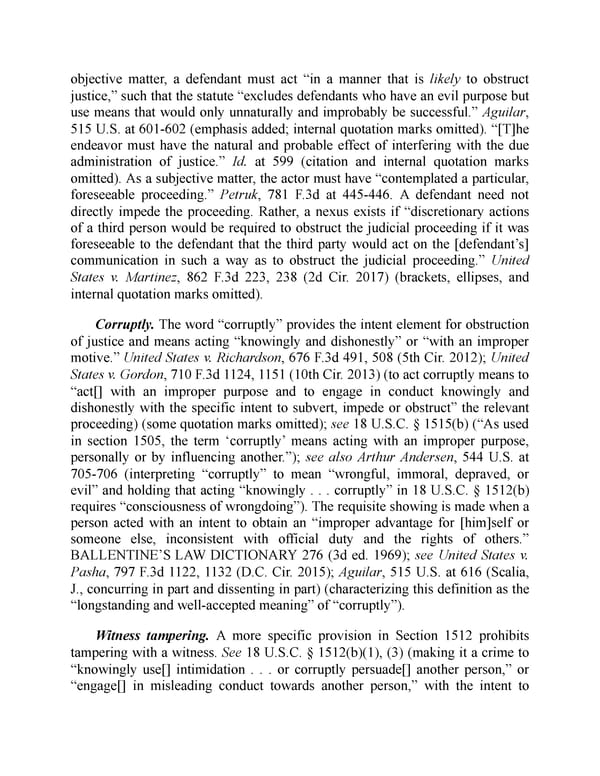objective matter, a defendant must act “in a manner that is likely to obstruct justice,” such that the statute “excludes defendants who have an evil purpose but use means that would only unnaturally and improbably be successful.” Aguilar, 515 U.S. at 601-602 (emphasis added; internal quotation marks omitted). “[T]he endeavor must have the natural and probable effect of interfering with the due administration of justice.” Id. at 599 (citation and internal quotation marks omitted). As a subjective matter, the actor must have “contemplated a particular, foreseeable proceeding.” Petruk, 781 F.3d at 445-446. A defendant need not directly impede the proceeding. Rather, a nexus exists if “discretionary actions of a third person would be required to obstruct the judicial proceeding if it was foreseeable to the defendant that the third party would act on the [defendant’s] communication in such a way as to obstruct the judicial proceeding.” United States v. Martinez, 862 F.3d 223, 238 (2d Cir. 2017) (brackets, ellipses, and internal quotation marks omitted). Corruptly. The word “corruptly” provides the intent element for obstruction of justice and means acting “knowingly and dishonestly” or “with an improper motive.” United States v. Richardson, 676 F.3d 491, 508 (5th Cir. 2012); United States v. Gordon, 710 F.3d 1124, 1151 (10th Cir. 2013) (to act corruptly means to “act[] with an improper purpose and to engage in conduct knowingly and dishonestly with the specific intent to subvert, impede or obstruct” the relevant proceeding) (some quotation marks omitted); see 18 U.S.C. § 1515(b) (“As used in section 1505, the term ‘corruptly’ means acting with an improper purpose, personally or by influencing another.”); see also Arthur Andersen, 544 U.S. at 705-706 (interpreting “corruptly” to mean “wrongful, immoral, depraved, or evil” and holding that acting “knowingly . . . corruptly” in 18 U.S.C. § 1512(b) requires “consciousness of wrongdoing”). The requisite showing is made when a person acted with an intent to obtain an “improper advantage for [him]self or someone else, inconsistent with official duty and the rights of others.” BALLENTINE’S LAW DICTIONARY 276 (3d ed. 1969); see United States v. Pasha, 797 F.3d 1122, 1132 (D.C. Cir. 2015); Aguilar, 515 U.S. at 616 (Scalia, J., concurring in part and dissenting in part) (characterizing this definition as the “longstanding and well-accepted meaning” of “corruptly”). Witness tampering. A more specific provision in Section 1512 prohibits tampering with a witness. See 18 U.S.C. § 1512(b)(1), (3) (making it a crime to “knowingly use[] intimidation . . . or corruptly persuade[] another person,” or “engage[] in misleading conduct towards another person,” with the intent to
 Mueller Report PDF Page 286 Page 288
Mueller Report PDF Page 286 Page 288